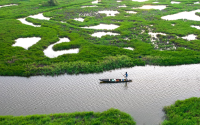11 December 2006The New York Times
New studies project that the Arctic Ocean could be mostly open water in summer by 2040 — several decades earlier than previously expected — partly as a result of global warming caused by emissions of greenhouse gases.
The projections come from computer simulations of climate and ice and from direct measurements showing that the amount of ice coverage has been declining for 30 years.
The latest modeling study, being published on Tuesday in the journal Geophysical Research Letters, was led by Marika Holland of the National Center for Atmospheric Research in Boulder, Colo.
The study involved seven fresh simulations on supercomputers at the atmospheric center, as well as an analysis of simulations developed by independent groups. In simulations where emissions continue to rise, sea ice persists for long periods but then abruptly gives way to open water, Dr. Holland said.
In the simulations, the shift seems to occur when a pulse of warm Atlantic Ocean water combines with the thinning and retreat of ice under the influence of the global warming trend.
Scientists ascribe most of that planet-scale warming, including a warming of the shallow layers of the oceans, to the buildup of carbon dioxide and other heat-trapping smokestack and tailpipe gases in the atmosphere.
After 2040 or so, ice persists in summer mainly around Canada’s northern maze of islands and the northern coast of Greenland, a region that always tends to accumulate a clot of thick ice.
Separately, scientists at the National Snow and Ice Data Center in Boulder found that the normal expansion of sea ice as the Arctic chilled in fall had been extraordinarily sluggish this year, following a pattern seen in recent years. The November average ice coverage was by far the lowest since satellite measurements began in 1979, said Walt Meier, a scientist at the ice center.
“It’s becoming increasingly unlikely that things will be able to turn around,” he said. “It would take several very cold winters and cool summers, which seems unlikely under global warming conditions.”
Several experts not involved with the studies said they were significant for human affairs, as well as biology.
Polar bears will struggle, these scientists said, and so will Arctic people who still go out on sea ice to hunt seals. By contrast, countries and businesses pursuing new shipping lanes, energy supplies and fishing grounds could profit.
The melting is likely to shift weather patterns, too. More sea ice means colder winters, because frigid winds blowing over ice pick up little heat from the warmer waters below.
The change will have ramifications beyond summertime, experts said. Having open water each year would mean that almost all ice forming in winter would be freshly frozen and just a yard or so thick.
This would greatly ease the task of maintaining shipping lanes with icebreaking vessels, said Lawson W. Brigham, deputy director of the Arctic Research Commission, a body that advises the White House on Arctic matters.
Mr. Brigham and other experts said the new research raised the urgency of establishing common standards for protecting the Arctic environment and patrolling shipping lanes.
The commission plans to deliver letters to the Bush administration and Congress this week urging them to commit at least $1 million to start work on replacing the country’s two aging, ailing polar-class icebreakers.






